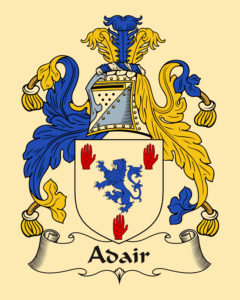
We sell our products exclusively on Amazon so you can buy with confidence knowing you are protected by Amazons no hassle return policy and our 4.9 star lifetime seller rating with over 2000 reviews. Items featuring a family crest make great gifts, whether for yourself or that hard to buy for family member, friend or co-worker.
We also sell customized license plates (add your own image and text). customizable mugs and license plates for military veterans, classic art on mouse pads and posters, a wide variety of flag license plates for nations around the world as well as pride flags and Native American tribal flags. Click here to go to our Amazon Store front.
We sell Mugs, Plaques, Prints, Ceramic Tiles, Coasters, Garden Flags, License Plates and Mouse Pads featuring The Adair Coat of Arms. Click the image to go to Anglo/Irish names A section of our Amazon store.
Etymology
The surname “Adair” is of Anglo-Irish origin and has a rich history, with roots in both England and Ireland. The name is believed to be of Scottish origin, derived from the old Gaelic name “Mac an t-Saoir,” meaning “son of the carpenter” or “wright.” Over time, this Gaelic name evolved into the surname Adair, reflecting the linguistic and cultural influences in the British Isles.
Early Origins and Use in Scotland and Ireland
The earliest use of the surname Adair is traced back to Scotland, where it was first recorded as “Adare” or “Adeir” in the 12th and 13th centuries. The family was associated with the region of Galloway in southwestern Scotland, where they held lands and titles. The Adair family was prominent in this area, and they were known for their involvement in local governance and military affairs.
In Ireland, the name Adair became more prominent in the 17th century, likely as a result of Scottish migration during the Ulster Plantation period. The Ulster Plantation was a colonization effort by the British Crown, where English and Scottish settlers were encouraged to move to the northern part of Ireland. The Adair family settled in County Antrim, where they established themselves as landowners and influential figures. The Irish branch of the Adair family played a significant role in the history and politics of the region.
Early Recorded Use in England
While the surname Adair is primarily associated with Scotland and Ireland, it also appears in early records in England. The earliest recorded use of the surname in England dates back to the 16th and 17th centuries. The Adair family in England was not as prominent as their Scottish and Irish counterparts, but they were present in various regions, including London and the Midlands. The English Adairs were often involved in trade and commerce, reflecting the more urban and economically diverse nature of English society.
Migration to the United States
The surname Adair made its way to the United States during the waves of British and Irish immigration in the 18th and 19th centuries. Many Adairs emigrated to North America in search of better economic opportunities and to escape political and religious conflicts in their homeland. The name became established in the United States, particularly in the southern states such as South Carolina, Georgia, and Tennessee. The Adair family in America became involved in various aspects of society, including agriculture, business, and politics.
One notable figure with the surname Adair in the United States was John Adair, a prominent politician and military officer. Born in 1757 in Chester County, South Carolina, John Adair served as a soldier in the American Revolutionary War and later became the Governor of Kentucky. He was also a U.S. Senator, making significant contributions to the early political landscape of the United States.
Spelling Variations
The surname Adair has undergone various spelling changes over the centuries, reflecting the linguistic diversity and phonetic evolution of the regions where it was used. Some common variations of the surname include:
Adare: primarily used in Scotland, Adeir: early Scottish form, Ader: A simplified version, Adder: A variation from phonetic spelling, Aders: A pluralized form, Adairis: potentially influenced by Irish phonetics, Adoir: An unusual variation, possibly due to transcription errors, Adayre: phonetic approach to spelling
These variations illustrate the fluid nature of surname spelling in historical records, influenced by factors such as regional dialects, literacy levels, and the interpretation of clerks and scribes.
Conclusion
The surname Adair has a rich and varied history, with roots in both Scotland and Ireland. It has evolved through different regions and periods, with notable presences in England and the United States. The name reflects a lineage of individuals involved in diverse aspects of society, from landownership and politics to commerce and military service. The numerous spelling variations of the surname Adair highlight the complexities of historical record-keeping and the cultural influences that shape family names over time.